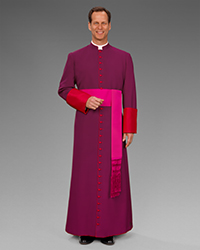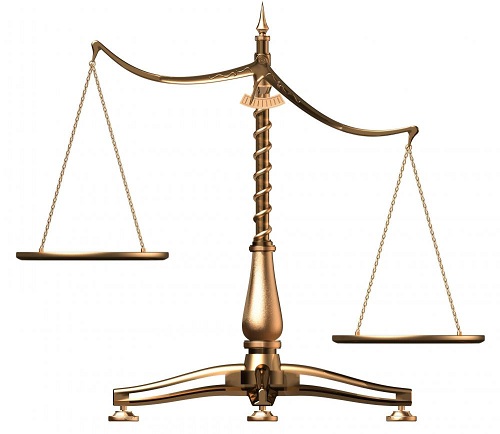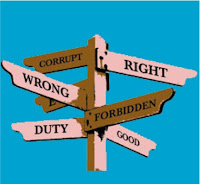
A Ceremony “Robing” New Monsignori
Big “insider baseball” church news was the decision of Pope Francis to eliminate all but the lowest “rank” of Monsignor, and then to restrict even that form to diocesan priests over 65. There have been all kinds of interesting reactions to this news! One one side of the spectrum are those who find the move refreshing and a good first step at eliminating a sense of medieval-ism and careerism within the clergy; on the other, heads are exploding over this smack to the side of the clerical heads of those who found becoming a monsignor an affirmation of their personal and ecclesial worth. One priest-blogger criticized that this decision was not made by the Pope in any kind of consultative manner and that perhaps it would be best for such matters to be dealt with on a local (diocesan) level. Sorry, Father, it couldn’t work that way: “Being a monsignor” was always a PAPAL prerogative; it was his “gift”, although bishops would nominate men for the honor. As the maxim has it, “he who gives, takes away.” Furthermore, the pope DID consult on this decision. He put a months-long moratorium on making any new monsignors, and I think it’s safe to assume he discussed this with his special group of Cardinal-advisors at their recent meeting. This shouldn’t have surprised anyone at all!
For those new to this kind of thing, what are we talking about here?
First, Christ didn’t name “monsignors” (monsignori if you want to sound like Father Z). This was a creation by church leadership as the “course of honors” (cursus honorum) developed through the post-Constantinian marriage of church and state which lasted until the American Revolution. Just as secular honorifics and structures were created, they were paralleled in church honorifics and structures. The word itself simply means “my lord”, and in some countries, it is actually a title used for a bishop. It has absolutely NO connection to the sacrament of Holy Orders, although it is restricted to men who are in the Order of Presbyters. As a deacon, of course, I never had any hopes of ever being a Monsignor anyway! But people should understand that if their pastor went from being called “Father” to “Monsignor”, it didn’t mean that he had any more “sacred power” than a simple priest. It was purely an honorific, usually given to two broad categories of priests: those who were younger and being signaled as those who might someday become bishops, and on those older men whom the bishop wanted to thank for a ministry well served. As one priest-friend put it when he became a Monsignor, “I asked the bishop why he had done this. He told me he wanted to thank me. I asked him, ‘Why not just take me to dinner?’ I can’t even spell ‘Monsignor’!” Later, my friend was named a bishop. After his episcopal ordination, he e-mailed me that “at least I can spell ‘bishop.'”
Second, a bit of contemporary perspective. As I’ve written about before, I’ve been around church and ministry for my whole life, and was in the seminary myself for high school and college (1963-1971). Even before that time, the majority of the priests I knew in my diocese detested the idea of becoming a Monsignor. On the one hand, we had a great Monsignor in our parish, and we all loved him. He was Monsignor Patrick O’Connor Culleton, ordained in Dublin in 1901, came to our Diocese in Illinois early on, and became pastor at our parish in 1920; he remained pastor there until his death in the late 1950’s. He was the pastor when a young newly-ordained priest named Fulton Sheen came to the parish for his first assignment. Sheen always said that the Monsignor was the holiest priest he’d ever known. But the younger priests — most of them anyway — wanted nothing to do with this kind of honorific, claiming that it was a relic of a time gone by that had no relevance whatsoever in the Church serving in the modern world. It made no difference at all when one was marching for civil rights, or visiting people in an inner city slum. In short, monsignori were seen as belonging to a different era in the life of the church.
The bishops at the Second Vatican Council agreed. They were dead set against retaining structures and processes that no longer served any practical, pastoral use in the life of the church, and they directed the Holy Father to streamline things. Pope Paul VI took this task on, and in 1972, the whole sacrament of Holy Orders was restructured, eliminating in the Latin Church the Rite of First Tonsure, the four minor orders and the major order of the Subdiaconate. The diaconate was now to be exercised permanently and could be opened to both celibate and married men. The same pope also reduced the number of “classes” or “ranks” of monsignori. No one really knows just how many classes there were! Some sources tally fifteen different classes of monsignor, others have twelve or thirteen. Pope Paul reduced them to three only. Now, Pope Francis has reduced this list to one, and then only for diocesan priests over the age of 65.
Paul reduced them to three only. Now, Pope Francis has reduced this list to one, and then only for diocesan priests over the age of 65.
What difference will this make?
1) On a practical level, absolutely none. A priest is a priest is a priest. That’s always been the case, sacramentally. This doesn’t change that. The best news is that priests don’t have to go out and buy all the fancy rig that was associated with being a monsignor.
2) For those men who actually wanted to be monsignori (and, at least in my humble experience, that’s been thankfully a very small number!), it will mean that they can now refocus their efforts on being the best priests they can be without waiting for a title or new clothes. In honor of their non-selection as monsignori, perhaps these men could join their deacons and lay folks in paying an extra visit to a homeless shelter or in lobbying for a change in unjust laws or for immigration reform. I’m not saying that these men are not doing good things already; but if they’re not going to have to worry about being a monsignor, they’ll be free to focus on other things. Like getting the smell of the sheep on their clothes.
 3) There IS a negative side to this. Our good priests DO deserve some kind of recognition and support for their ministry; all people who serve do! We do need to support our priests and acknowledge their service and commitment. Some bishops, out of a lack of any other ideas, thought that at least by getting the pope to name a priest a monsignor, this could be a small way of doing that. But here’s a chance for some grass-roots creativity and initiative! Being a monsignor was no way to recognize anyone, and in some men it just created more difficulties that it was worth. What CAN we do, in a positive way, to acknowledge someone’s service? No one who serves AS CHRIST SERVED needs or wants recognition. The only human recognition Christ got was to be nailed to a cross, after all. Still, as human beings, it’s nice to know when something we’ve done has been effective. What can we do, what can YOU do, to show appreciation to ALL who serve in the name of Christ and in the name of the Church?
3) There IS a negative side to this. Our good priests DO deserve some kind of recognition and support for their ministry; all people who serve do! We do need to support our priests and acknowledge their service and commitment. Some bishops, out of a lack of any other ideas, thought that at least by getting the pope to name a priest a monsignor, this could be a small way of doing that. But here’s a chance for some grass-roots creativity and initiative! Being a monsignor was no way to recognize anyone, and in some men it just created more difficulties that it was worth. What CAN we do, in a positive way, to acknowledge someone’s service? No one who serves AS CHRIST SERVED needs or wants recognition. The only human recognition Christ got was to be nailed to a cross, after all. Still, as human beings, it’s nice to know when something we’ve done has been effective. What can we do, what can YOU do, to show appreciation to ALL who serve in the name of Christ and in the name of the Church?
UPDATE
As I continue to follow the various blog responses to this issue, I was struck by something. It seems to me, anecdotally and not based on any scientific analysis, that most of the folks OBJECTING to the loss of new monsignors are people who are converts to Catholicism. By and large, so-called “cradle Catholics” like myself are all in favor of it; those who have come later to the Church seem to be suffering the loss. File in the “interesting, for what it’s worth” categories.
Happy New Year!




 Now, Act II is over. The general campaign was brutal, bloody, bizarre, virulent, draining and depressing as two vastly different visions of our nation emerged. Let’s face it: today as I write these words, no one is completely satisfied with the process or even the outcome. The wounds and the scars are deep. But now Act II is also completed, with the election of Donald J. Trump as president-elect of the United States of America. We’re now in the intermission of the transition, and that will end on 20 January 2017 when Mr. Trump places his hand on a Bible and swears the Oath of Office and he becomes President Trump. At that moment, the curtain will rise on Act III.
Now, Act II is over. The general campaign was brutal, bloody, bizarre, virulent, draining and depressing as two vastly different visions of our nation emerged. Let’s face it: today as I write these words, no one is completely satisfied with the process or even the outcome. The wounds and the scars are deep. But now Act II is also completed, with the election of Donald J. Trump as president-elect of the United States of America. We’re now in the intermission of the transition, and that will end on 20 January 2017 when Mr. Trump places his hand on a Bible and swears the Oath of Office and he becomes President Trump. At that moment, the curtain will rise on Act III. The question for all of us is quite simple: What do we do now? We are not an audience at a play. We are not observers, but participants in our public life. There is a term which became common during the Second Vatican Council: we are “co-responsible” for our lives and the life of our republic. So where does that lead us today, the first day following the election? The people who supported and voted for Donald Trump are ecstatic and triumphant; those who supported and voted for Hillary Clinton are reeling and depressed. Those who supported third party candidates or who chose not to vote for any candidate are, well, I honestly don’t know how they feel. But the bottom line, in my opinion, is that one feeling is prevalent on both sides of the political divide: almost everyone is feeling cut off and disenfranchised. That was the stated position of those who supported Mr. Trump; it is also the position of those who supported Mr. Sanders and Mrs. Clinton. What should we be doing as we prepare for Act III?
The question for all of us is quite simple: What do we do now? We are not an audience at a play. We are not observers, but participants in our public life. There is a term which became common during the Second Vatican Council: we are “co-responsible” for our lives and the life of our republic. So where does that lead us today, the first day following the election? The people who supported and voted for Donald Trump are ecstatic and triumphant; those who supported and voted for Hillary Clinton are reeling and depressed. Those who supported third party candidates or who chose not to vote for any candidate are, well, I honestly don’t know how they feel. But the bottom line, in my opinion, is that one feeling is prevalent on both sides of the political divide: almost everyone is feeling cut off and disenfranchised. That was the stated position of those who supported Mr. Trump; it is also the position of those who supported Mr. Sanders and Mrs. Clinton. What should we be doing as we prepare for Act III? Homer’s Odysseus, navigating his way home after the Trojan War, encounters the twin hazards of the Scylla and Charybdis: steer too close to the “rocks” of the Scylla and six sailors will be taken; steer too close the whirlpool Charybdis and the whole ship and crew will be lost. It’s the classic conundrum much like our own expression of being “between a rock and a hard place.” In today’s America, then, do we just proceed as we have over the last year and a half, and keep speaking of the Scylla of “winners” and the Charybdis of “losers”? Is there a way, perhaps of navigating between these two hazards and overcoming some of the polarities of our national life? There are people — good people! — who supported and voted for Donald Trump. There are people — good people! — who supported and voted for Hillary Clinton (and for other candidates). Caricatures on both sides will not help us move forward.
Homer’s Odysseus, navigating his way home after the Trojan War, encounters the twin hazards of the Scylla and Charybdis: steer too close to the “rocks” of the Scylla and six sailors will be taken; steer too close the whirlpool Charybdis and the whole ship and crew will be lost. It’s the classic conundrum much like our own expression of being “between a rock and a hard place.” In today’s America, then, do we just proceed as we have over the last year and a half, and keep speaking of the Scylla of “winners” and the Charybdis of “losers”? Is there a way, perhaps of navigating between these two hazards and overcoming some of the polarities of our national life? There are people — good people! — who supported and voted for Donald Trump. There are people — good people! — who supported and voted for Hillary Clinton (and for other candidates). Caricatures on both sides will not help us move forward.









